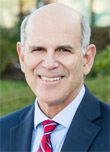2 Emerging Investigators Share Their Journeys Into Clinical Research
A conversation with Richard Bernstein, MD, and Thomas Moriarity, MD

There is an urgent need to introduce more physicians to clinical research and train the next generation of investigators to reach more patients with participation opportunities. This is crucial, not only to address the shortage of physicians needed for successful clinical trials, but also to ensure patients have access to all available care options. By introducing patients to clinical research through their trusted provider, the clinical trial journey becomes an organic and integral part of their overall healthcare experience. Furthermore, it ensures the industry has access to more diverse patients, which increases the quality and applicability of the data generated.
Relying heavily on highly experienced investigators is an unsustainable trend that hinders the progression of clinical research. Expanding the pool to include investigators like Richard Bernstein, MD, and Thomas Moriarity, MD, is a vital step to addressing this challenge. Bernstein and Moriarity are deeply committed, highly engaged, and excited about the opportunity to offer the benefits of participation in trials to their patients. Both members of the physician-led Privia Medical Group, Bernstein practices at Annapolis Allergy and Health in Annapolis, MD, and Moriarity at SouthCoast Health in Savannah, GA. They partner with Javara, an IRO (integrated research organization), to help integrate clinical research into their everyday medical practices.
What originally motivated you to get involved in clinical research?

BERNSTEIN: In my more than 30 years in practice, I have always had research in my sights. I believe that if you are not at the forefront, you are behind. That is part of the reason I favor the concept of getting physicians involved in other avenues.

Additionally, we cannot always provide patients the treatments we would like. Through clinical research, we have the opportunity to get patients involved in studies who may otherwise not have access to certain medications or a high level of care.
But more than that, I think of myself as a small cog in the wheel – clinical research is really bigger than one individual within the studies. Working together as a team, we can make a huge impact on quality of care.
Pharmaceutical companies often look for investigators with an established track record; however, there is currently a shift toward including newer investigators. Why is this so critical?
BERNSTEIN: If the goal is to provide access to a large, diverse patient population, you need a lot of different doctors from different backgrounds because, in reality, people trust their physician. If a patient's physician thinks it's a good idea for them to join a trial, they are much more likely to do it than say, responding to an ad. Medicine is evolving and I think that clinical research should evolve to adapt to the trends.
MORIARITY: When physicians who are part of independent local practices get involved, it allows for a more diverse patient population. This means more opportunities and more sites to complete the clinical trials, which is critical in the upcoming years to meet the needs of all the new drugs, vaccines, and therapies that are trying to come to market.
What was your experience with the training process as you were getting started?
MORIARITY: I am brand-new to clinical research, so our research partner has been essential for the handholding I needed. Fantastic physician educators also play a key role. There was both online and in-person training where I had all my questions answered. In fact, it's been a much better and easier experience than I anticipated.
BERNSTEIN: It was very reassuring to be told, "Basically you just want to be a good doctor." A great partner will provide support to ensure the investigators have everything they need to feel comfortable. They remove the drudgery so the physician can do his or her job, follow the protocols, and be attentive to the patients. The team a new investigator partners with is imperative for their success.
For the COVID vaccine trials in which we participated, the scope was massive, involving more resources than we would have anticipated. Our research partner ensured we could adapt and continue to carry out such a huge trial in a professional manner. Together, we have continuously performed at the highest level within the studies in terms of patients enrolled and sponsor satisfaction. Even with new investigators, we have performed at a very high level in terms of what the pharmaceutical industry is looking for, which is something to be proud of.
What types of support do you feel are necessary to ensure new investigators are set up for success?
MORIARITY: Originally, I was somewhat daunted by the steps necessary to start in research. Working with an outstanding research partner has certainly made that a very easy process for me. They have been extremely helpful, providing the clinical research staff and support I need to be successful, as well as helping me train and become qualified.
My main concern at the outset was the time commitment and how I could fit it in with my busy practice—I go to the hospital; I see 25 patients a day. I was surprised and relieved that I was given excellent support to put the processes in place to help me integrate clinical research with my office practice. It has been seamless. I have been able to marry studies with my own interests and ensure the right patient population was involved.
BERNSTEIN: I am involved in clinical research on two levels, as a medical director and as an individual investigator. What is important to this success is the culture of a research partner, which starts from the top down—its leadership, passion, and desire to improve patient care.
It is imperative that investigators work with partners who share the same values, such as seeing clinical research as bigger than the individual investigator, the importance of helping those less fortunate, and incorporating the need to be philanthropic.
A critical factor is attention to detail and the ability to have the foresight to accomplish the set goals while mitigating any disruptions. At the same time, a great partner will have the ability to look back and say, "What do we need to do to be better?"
Because we do not have a big multi-specialty office, we had to figure out how to incorporate clinical research into small physician groups. That in itself provides challenges as we grow our clinical practice in this area, and we needed to ensure we found the best partner for that situation.
Parting thoughts?
MORIARITY: A hugely rewarding part of doing clinical research is the fact that your efforts can help potentially hundreds of thousands or even millions of people, preventing or treating disease. I think any physician with interest should try it out. It's much easier to integrate into your practice than you think. Patients really value having a physician who is involved in clinical research, and our patients have provided wonderful feedback regarding their experience.
BERNSTEIN: Patients often lack access to treatments. We know that social determinants of health are a greater predictor of outcomes than accurate disease diagnosis and treatment. We are forever seeing patients who cannot afford the medication that we'd like to prescribe for them. Clinical research offers an avenue to help provide support. It improves our ability to provide better care and at a lower cost for our patients overall.
Bernstein’s and Moriarity's experiences confirm the benefits of empowering emerging investigators to successfully incorporate clinical research into their practices. Although these investigators may be "research naïve," their positions as trusted community physicians bring a wealth of experience and invaluable insight to the table. With unwavering support and powerful mentorship, physicians eager and motivated to newly participate in research will help fill the urgent need for investigators who can help usher new innovations through development. These individuals play a crucial role not only in the drug advancement pipeline but in ensuring patients continue to have access to clinical care.
